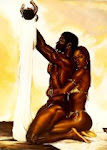
It is amazing how wrong the warped perceptions of the IR and Black Woman Empowerment Bloggers are. This is the price they pay for citing their alleged perceptions as facts. One of their errors is the routine claim that due to the (imagined) beating that they take from the black community, black women have low self-esteem and are discontent with their lives. The problem is that research from experts shows the exact opposite. Here are some excerpts:
There Are Differences In Self-esteem Between African-American Caucasian Women Living in the United States.
Self-esteem is an internal belief system about one's self (Wilson 1). Our basic self-esteem develops during childhood to the age of about 12 (Wilson 1). Some variables that can influence one's self-esteem include individual skills, interests, and talents, economic status, community and culture (Wilson 2). African-American women will say positive things about themselves that Caucasian women are not comfortable with saying about themselves (Dent 1).Rushton found that African-American women have equal or higher self-esteem levels then Caucasians or Latinos (Rushton 9). Gray-Little found that not only African-American adult women have higher self-esteem than Caucasian women but the same is true in children and adolescents (Gray-Little 17). Abba supports the idea that African-American's hold higher self-esteem standings throughout life (Abbas 2). Differences in self-esteem between African-American women and Caucasian's are less during childhood years and grow to adulthood (Twenge 1). Support for this may be that a woman's sense of identity forms throughout her lifespan (Lafromboise 2). Contradicting information states that Caucasians develop self-concepts as a race earlier because the Caucasians having great sociopolitical power which causes less issues to work though during racial identity development (Hill 5).Caucasian and African-American women hold significantly different views of beauty and perceptions of themselves (Molloy 1). Molloy finds that African-American women have higher self-esteem levels based on body image than Caucasians (Molloy 1). African-American females are less worried about weight, dieting, or being thin (Molloy 1). Sixty-four percent of African-American women said that they'd rather be "a little overweight" than "a little underweight" (Molloy 1). The differences in views may help one understand why eating disorders such as bulimia and anorexia is predominantly seen in white women ( Molloy 1). Ossolotch supports this by stating that people with low self-esteem have a greater-risk of developing an eating disorder (Ossolotch 1). Eating disorders are a growing problem with African-American women (Edwards 1). Edwards says this is because of insensitive remarks being made by family members and friends as well as employers making them feel as though they need to lose weight to compete with the Caucasian woman (Edwards 1).Depression is also found to be more dominant in Caucasian women than African-American women (Abbas 2). Dent supports this by saying that low self-esteem causes greater risks for eating disorders, suicide, and depression (Dent 1). In 2000 the suicide rate for a population of 100,000 was 1.8 for African-American females and 4.3 for Caucasian women (Eshleman 191).Both Caucasians and African-American women base part of their self-esteem about their bodies on what they think the men of their race prefer (Molloy 1). African-American women tend to believe that African-American men prefer larger women, so they feel less pressure to lose weight then Caucasian women who believe Caucasian men prefer thin women (Molloy 1). Research done on males preferences tended to support these views (Molloy 1). Molloy says that African-American women who predominantly surround themselves with others of their race as apposed to members of the opposite race have higher self-esteem because they are "protected" from Caucasians distorted body image (Molloy 2).Molloy suggests that gender role also plays a role in women's self-esteem based on their bodies (Molloy 1). African-American women are more likely to see themselves are masculine or androgynous whereas white women see themselves are more feminine (Molloy 1). Women who feel more feminine are more likely to give in to stereotypical views on appearances (Molloy 2).Socioeconomic status have a more positive affect on Caucasian women as opposed to African-American women (Gray-Little 5). Wilson suggested that African-American women of lower socioeconomic status' were more comfortable with having a heavier body type than higher socioeconomic African-American women (Wilson 2). Contradicting research says that African-American tend to have higher self-esteem levels throughout socioeconomic status ( Abbas 2). Since African-American women are subjected to longstanding socioeconomic inequalities yet still show higher levels of self-esteem suggests that socioeconomic factors do not affect their self-esteem (Abbas 3).Boisnier did a study on feminism and womanism among Caucasian and African-American women and found that African-American women identify with womanism because it calls for high levels self-esteem (Boisnier 2). Foster and Petty suggest that black organizations and social interaction help raise self-pride and help them identify with their race (Eshleman 190).
So basically, black women not only have higher self-esteem, but have it across all economic levels and black women who live in the black community have higher self-esteem than those who live outside of the black community. Maybe this is why very few are fleeing the "dreaded" black community the way that the IR bloggers want them to. Maybe this is why few are running to the arms of the "white savior". Maybe it is because black women in general, being some of the main architects of the black community, actually are content within the very black community that they helped build.



















